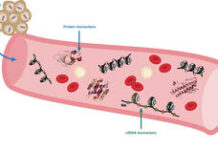On 19 April 2023, the US Food and Drug Administration (FDA) approved polatuzumab vedotin-piiq (Polivy, Genentech, Inc.) with a rituximab product, cyclophosphamide, doxorubicin, and prednisone (R-CHP) for adult patients who have previously untreated diffuse large B-cell lymphoma (DLBCL), not otherwise specified (NOS), or high-grade B-cell lymphoma (HGBL) and who have an International Prognostic Index (IPI) score of 2 or greater.
Full prescribing information for Polivy is available here.
Approval was based on POLARIX (NCT03274492), a randomised, double-blind, placebo-controlled study in 879 patients with previously untreated large B-cell lymphoma and an IPI score of 2-5. The study evaluated the superiority of substituting polatuzumab vedotin for vincristine in the R-CHOP (rituximab, cyclophosphamide, doxorubicin, vincristine, and prednisone) regimen. Patients were randomised (1:1) to receive either polatuzumab vedotin plus R-CHP (pola + R-CHP) or R-CHOP for six 21-day cycles, followed by two additional cycles of rituximab alone in both arms. The main diagnoses were de novo DLBCL, NOS (84%) and HGBL (11%).
Efficacy was based on investigator-assessed progression-free survival (PFS). PFS was statistically significantly longer in the pola + R-CHP arm, with a hazard ratio (HR) of 0.73 (95% confidence interval [CI] 0.57, 0.95; p = 0.0177). This arm also had a statistically significant improvement in modified event-free survival (HR 0.75, 95% CI 0.58, 0.96; p = 0.0244). No significant difference in complete response rate or overall survival (HR 0.94, 95% CI 0.67, 1.33 on final analysis) was observed.
The most common adverse reactions with pola + R-CHP (≥20%), excluding laboratory abnormalities, were peripheral neuropathy, nausea, fatigue, diarrhoea, constipation, alopecia, and mucositis. Grade 3 to 4 laboratory abnormalities (≥10%) were lymphopenia, neutropenia, hyperuricemia, and anaemia. Peripheral neuropathy developed or worsened in 53% of patients, with resolution in 58% after a median of 4 months. Serious adverse reactions occurred in 34% of patients, including febrile neutropenia and pneumonia.
The recommended dose of polatuzumab vedotin is 1.8 mg/kg as an intravenous infusion every 21 days for 6 cycles in combination with R-CHP. Patients should be premedicated with an antihistamine and antipyretic and receive prophylactic granulocyte colony-stimulating factor.
This review used the Assessment Aid, a voluntary submission from the applicant to facilitate the FDA’s assessment.
This application was granted orphan drug designation.
Healthcare professionals should report all serious adverse events suspected to be associated with the use of any medicine and device to FDA’s MedWatch Reporting System.
For assistance with single-patient INDs for investigational oncology products, healthcare professionals may contact FDA’s Oncology Center of Excellence Project Facilitate.






